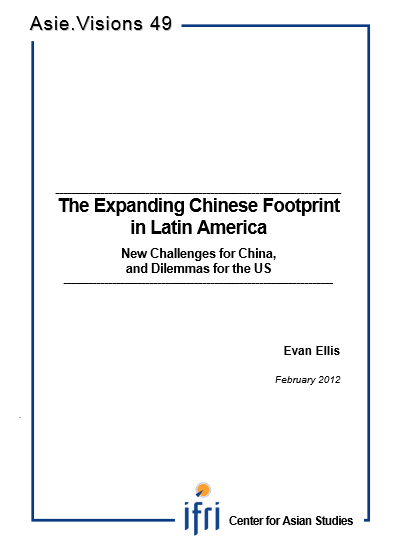The Expanding Chinese Footprint in Latin America: New Challenges for China, and Dilemmas for the US

The physical presence of China in Latin America is entering a phase of significant expansion, as the logical consequence of the rapid growth over the past decade of its trade, investment, and infrastructure for doing business in the region.
The new Chinese physical presence in Latin America is focused in five areas, each with its own dynamics and consequences:
- (1) leaders visits, business delegations, students and other official groups,
- (2) construction and infrastructure projects,
- (3) extractive industry investments and associated service companies,
- (4) retail and manufacturing, and
- (5) tourism.
The growing Chinese physical presence will generate challenges which will make it increasingly difficult for the PRC to maintain, in fact, its policy of non-interference in the internal politics of the region.
The PRC is likely to employ its growing understanding of, and sources of leverage in Latin America to protect its increasingly important interests in the region, while simultaneously attempting to avoid that its actions to defend its interests are seen in threatening terms by the United States or other strategically important partners.

Available in:
Regions and themes
ISBN / ISSN
Share
Download the full analysis
This page contains only a summary of our work. If you would like to have access to all the information from our research on the subject, you can download the full version in PDF format.
The Expanding Chinese Footprint in Latin America: New Challenges for China, and Dilemmas for the US
Related centers and programs
Discover our other research centers and programsFind out more
Discover all our analyses
RAMSES 2024. A World to Be Remade
For its 42nd edition, RAMSES 2024 identifies three major challenges for 2024.
France and the Philippines should anchor their maritime partnership
With shared interests in promoting international law and sustainable development, France and the Philippines should strengthen their maritime cooperation in the Indo-Pacific. Through bilateral agreements, expanded joint exercises and the exchange of best practices, both nations can enhance maritime domain awareness, counter security threats and develop blue economy initiatives. This deeper collaboration would reinforce stability and environmental stewardship across the region.

The China-led AIIB, a geopolitical tool?
The establishment of the Asian Infrastructure Investment Bank (AIIB) in 2016, on a Chinese initiative, constituted an attempt to bridge the gap in infrastructure financing in Asia. However, it was also perceived in the West as a potential vehicle for China’s geostrategic agendas, fueling the suspicion that the institution might compete rather than align with existing multilateral development banks (MDBs) and impose its own standards.
Jammu and Kashmir in the Aftermath of August 2019
The abrogation of Article 370, which granted special status to the state of Jammu and Kashmir (J&K), has been on the agenda of the Bharatiya Janata Party (BJP) for many decades.





